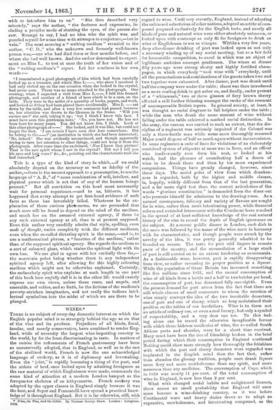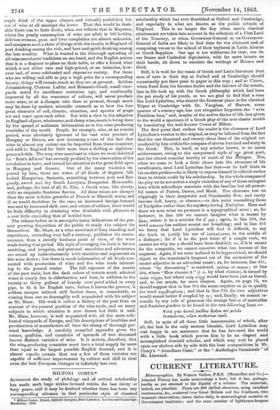WINES.*
THERE is no subject of every-day domestic interest on which the English popular mind is so strangely behind the age as on that of the vine and its produce. Prejudices of all kinds, fiscal, insular, and merely conservative, have combined to render Eng- land, while of necessity the largest wine importing country in the world, by far the least discriminating in taste. In matters of the cuisine the refinements of French gastronomy have been so unreservedly adopted, that in England, as well as in the rest of the civilized world, French is now the one acknowledged language of cookery, as it is of diplomacy and lovemaking. Even the " joint," is rapidly becoming a thing of the past, and the sirloin of beef, once looked upon by admiring foreigners as the raw material of which Englishmen were made, commands the same kind of attention at a modern London banquet as the forequarter skeleton of an ictbyosaurus. French cookery was adopted by the upper classes in England simply because it was the best, and Soyer and Francatelli have spread a practical know- ledge of it throughout England. But it is far otherwise, still, with Wine, at ruse, and the Cellar. By Thomas George Shaw. London: Longman. 18$3.
regard to wine. Until very recently, England, instead of adopting the unbiassed eclecticism of o Cher nations, adopted an artificial coin- pound prepared exclusively for the English taste, and nearly all kinds of pure and natural wino were either absolutely unknown, or looked upon with contempt as only fit for foreigners to drink as wine or Englishmen to use as vinegar. Within a very few years, deep after-dinner drinking of port was looked upon as not only a necessary winding up of any social meeting, but as a fair field for honourable competition, to excel in which was an object of legitimate ambition amongst gentlemen. The wines at dinner fifty years ago were strong sherry and highly fortified cham- pagne, in which everybody " took wine with " everybody, until all the permutations and combinations of the guests taken two and two together were exhausted. After dinner, port was drunk until half the company were under the table; claret was then introduced as a mere cooling drink to get sober on, and finally, under pretext of a " whitewash," two or three glasses of fiery brown sherry effected a still farther thinning amongst the ranks of the remnant of unconquerable British topers. In general society, at least, it was thought no social disgrace to fall helpless under the table ; while the man who drank the same amount of wine without falling under the table achieved a marked social distinction. In
the army, the custom was carried to such an extent, that the dis- cipline of a regiment was seriously impaired if the Colonel was only a three-bottle man while some more thoroughly seasoned Major could dispose of half as much again without inconvenience. In some regiments a code of fines for violations of an elaborately contrived system of etiquette at mess was in force, and an officer who inadvertently rose from his seat, or looked at his watch, had the pleasure of contributing half a dozen of wine to be drunk there and then by his more experienced companions. Things have greatly changed, however, since those days. The social point of view from which drunken- ness is regarded, both by the higher and middle classes, is, happily, widely different from that of the last generation, and a far more rigid test than the correct articulation of the words " glorious constitution " is demanded from the diner-out who presents himself for admission to the drawing-room. As a natural consequence, delicacy and variety of flavour are sought for in wine, rather than mere intoxicating power, while financial reform and extended intercourse with the Continent have resulted in the spread of at least sufficient knowledge of the real natural history of the vine to reveal the depth of English ignorance on the subject. At a recent public dinner in London, each dish in the menu was followed by the name of the wine most in harmony with its characteristics, and though people were struck by the novelty of the idea, it was pretty generally admitted to be founded on reason. The taste for port still lingers in remote parts of the country, and the accumulation of a large stock of port is still carried on to an extent bordering on monomania. As a fashionable wine, however, port is rapidly disappearing from view, or rather resuming its proper position as a liqueur. While the population of Great Britain has increased something like five millions since 1831, and the annual consumption of wine of all kinds from a bottle and a half to two bottles per head, the consumption of port, has decreased fully one-eighth. Even the present demand for port arises from the fact that there are still whole classes of small consumers to whom the mention of wine simply conveys the idea of the two inevitable decanters, one of port and one of sherry, which so long maintained their position on the tables of our forefathers. Wine is to them not an article of ordinary use, or even areal luxury, but only a symbol of respectability, and a very dear one too. To this feel- ing alone can be traced the otherwise inexplicable favour with which those hideous mockeries of wine, the so-called South African ports and sherries, were for a short time received. Many must have been the ties of friendship broken in the brief period during which their consumption in England continued Nothing could show more strongly how thoroughly the fetishism with which the port and sherry decanters were regarded was implanted in the English mind than the fact that, rather than abandon the gloomy tradition, people once drank liquors more fiery and more unwholesome than any spirit, and more nauseous than any medicine. The consumption of Cape, which in 1859 was nearly 11 per cent. of the total consumption of wine in England, is now less than 2 per cent.
What with changed social habits and enlightened finance, there seems no small probability that England will once more become a wine-drinking country, as it was before Continental wars and heavy duties drove us to adopt an expensive, unwholesome, and intoxicating compound, as the
staple drink of the upper classes, and virtually prohibited the use of wine at all amongst the lower. That this would be desir- able there can be little doubt, when one reflects that in Mayence, where the yearly consumption of wine per adult is 360 bottles, delirium tremens, gout, and liver complaints are almost unknown, and compares such a state of things with the results in England of port drinking among the rich, and beer and spirit drinking among the less wealthy. What is wanted is the thorough uprooting of all wine merchants' traditions on one hand, and the English notion that it is a disgrace to place on their table, or offer a friend, wine which is not either rare and high-priced, or an imitation, how- ever bad, of some celebrated and expensive variety. For those who are willing and able to pay a high price for a corresponding luxury, things will remain much as they are at present. Schloss Johannisberg, Chateau Lafitte, and Romance-Conti, small vine- yards noted for excellence centuries ago, and continually improved by all the resources of culture, will never produce more wine, or at a cheaper rate than at present, though much may be done by modern scientific research as to how the four great elements of soil, climate, situation, and species of grape act and react upon each other. But with a view to the adoption in England of pure, wholesome, and cheap wine, much is being done by the spread of authentic information as to the wine-producing countries of the world. People, for example, who, at no remote period, were absolutely ignorant of the vast wine produce of Hungary or Greece, are now becoming a.vare of the fact that wine to almost any extent can be imported from those countries, and sold in England for little more than a shilling or eighteen- pence a bottle. The very wine merchant to whom we were indebted for" South African" has recently profited by his observation of the revolution in taste, and turned his attention to the great field open in Hungary and Greece. Out of the many varieties im- ported by him, there are wines of all kinds of degrees, full- bodied Hungarian, Santorin, something between port and Bur- gundy, sweet and dry Greek Lacryma, Hungarian Muscatelle, and, perhaps, the best of all, St. Elie, a Greek wine, like sherry, with an exquisite Sauterne flavour. All these wines are cheaper than the most inferior growths of French or Rhenish wines, and if, as would doubtless be the case, an increased foreign demand was met by increased skill, care, and extent of culture, there would be little difficulty in obtaining wine drinkable with pleasure at a cost little exceeding that of bottled beer.
The volume before us is among the many indications of the pre- sent growing disposition of the public to study the subject for themselves; Mr. Shaw, as a wine merchant of long standing and experience, extending over half a century, publishes his remin- iscences, from a strictly business point of view, of the wine trade during that period. His style of arranging his facts is far too rambling, and irregular, and personal anecdotes and adventures are mixed up indiscriminately with statistics and arguments on the wine duties ; but there is much information of all kinds con- nected with production of wine and the wine trade interest- ing to the general reader. The full exposure of the secrets of the port trade, how the dark colour of certain much admired wines is simply due to elderberries, and bow, in addition to the twenty or thirty gallons of brandy over proof added to every pipe, to fit it for English taste, before it leaves the grower, it seldom escapes without still further doses, is remarkable, as coming from one so thoroughly well acquainted with his subject as Mr. Shaw. His work is rather a history of the past than an account of the present position of the wine trade, and on many subjects to which attention is now drawn but little is said. Mr. Shaw, however, is well acquainted with all the more cele- brated vineyards of Europe, and his descriptions of localities and peculiarities of manufacture all bear the stamp of thorough per- sonal knowledge. A. carefully compiled appendix gives the names, qualities, and countries of upwards of two thousand known distinct varieties of wine. It is certain, therefore, that the wine-producing countries must have a total supply far more than equal to the largest possible English demand, and it is almost equally certain that not a few of these varieties are capable of sufficient improvement by culture and skill to rival even the best European vintages at infinitely less cost.































 Previous page
Previous page